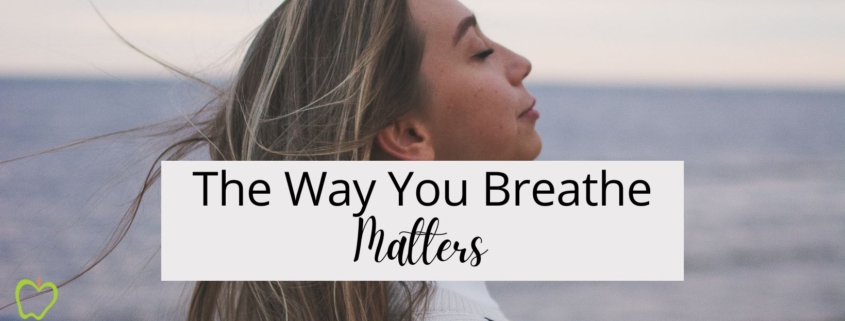The Way You Breathe Matters
If you are reading this, you are breathing. We tend to take breathing for granted unless we are having difficulty – then it is all we can think about. Have you ever paid attention to how you breathe, whether through your nose or your mouth?
You may think it doesn’t matter because both routes provide air for your lungs. Actually, the way you breathe matters.
Your body’s primary means of breathing is your nose, with your mouth being the backup route to bring air into your lungs. But some of us grew up with restrictions to nasal breathing, such as allergies causing congestion or a deviated septum. As a result, it became a habit to breathe through our mouths.
Assuming your nose isn’t congested now, try a little experiment. Put one hand on your lower belly and the other on your side at the base of your ribcage. Now take a deep breath through your mouth. Where did you feel the movement? For most people, the ribcage expands outward and the belly pulls in a bit.
Now take a deep breath through your nose with your hands in the same places. Where did you feel the movement this time? I feel my ribcage expand out and up while my belly expands outward.
Based on your observations, which do you feel provided the deeper effect? Generally, nasal breathing is more effective for drawing in a larger volume of air, and there are many other benefits:
The Benefits of Nasal Breathing
- Humidifies and filters the air coming in, which prevents irritation of vocal cords (important for singers).
- Produces nitric oxide which dilates blood vessels in the lungs to improve flow, and reduces cold symptoms and airway infections.
- Defends against inhaled pathogens which travel through hairs, and encounter mucus and immune cells in the nasal passage.
- Plays a vital role in thermoregulation, the body’s ability to maintain its core temperature.
- Helps to regulate water balance in the body by conserving water during exhalation.
- Induces relaxation via natural regulation of breathing pace through smaller nasal passages.
- And more … but I think you get the idea.
Of course, the nose also provides us with the benefit of smell and its effect on taste. It’s a busy organ in the body!
I’ve already mentioned some of the reasons that mouth breathing may become a habit. Other reasons can include asthma, swollen tonsils or adenoids, a history of thumb or finger sucking, tongue tie, bottle feeding or extended use of a pacifier, poor posture when sitting at a computer, or the breathing resistance caused by wearing a face mask.
The Challenges Caused by Mouth Breathing
- Needing to breathe while eating can prompt less chewing and more risk of food being drawn into the airway.
- More water is lost through mouth breathing, drying the mouth and encouraging bacterial growth, resulting in bad breath and more cavities.
- One is more susceptible to exercise-induced asthma, frequent colds, and respiratory infections.
- Long-term mouth breathing can increase blood pressure, stress-related issues, and cardiovascular disease risk.
- Mouth breathing from childhood affects the development of the jaw, teeth, and skull, resulting in the need for orthodontic treatment.
It is not uncommon to be unaware of whether you primarily breathe through your nose or your mouth. Do you often wake in the morning with a dry mouth, or your mouth dry frequently through the day, you likely breathe through your mouth. If you have a history of sinus or allergy issues, or you snore, you likely breathe through your mouth.
Among the issues with mouth breathing is promoting sympathetic nervous system activity (fight or flight) which can reduce heart rate variability. This is one of the negative effects of stress. Thankfully, a low heart rate variability can be improved by stimulating the Vagus Nerve and improving vagal tone.
I believe you can see the value in breathing primarily through your nose. It will take time and focus to retrain your body for nasal breathing, but the benefits for longevity are significant.
How to Retrain Your Breathing
You can start with something as simple as breathing – through your nose, of course. Breathing is one of the tools I recommend for my clients at regular intervals during the day. Slow, deep breathing has many therapeutic applications and benefits:
- It engages the diaphragm which engages the Vagus Nerve
- Deep breathing with diaphragm movement massages the heart from inside the body
- Slow exhalations engage the parasympathetic nervous system to promote “rest, digest, and heal”
Box breathing with even inhalation and exhalation does not engage the nervous system. Following a 4-7-8 pattern is more effective. Inhale through your nose to the count of 4, hold it for 7 counts, and exhale through the mouth to the count of 8. Try it for yourself. Do a few repetitions of this breathing pattern, then close your eyes and note how your body feels.
How can you overcome mouth breathing when you sleep? I have found mouth-taping to be helpful. There are a variety of styles of mouth tape available online. I have found the X shape to be effective for me. Admittedly, I was concerned about claustrophobia but was surprised to find myself feeling calmer after applying the tape. Remember … nasal breathing is relaxing.
We all recognize how vital breathing is to life, but did you ever think the way you breathe is important? Explore the effect for yourself. Keep experimenting with breathing and focusing on doing so through your nose. I hope you will let me know what you discover.










